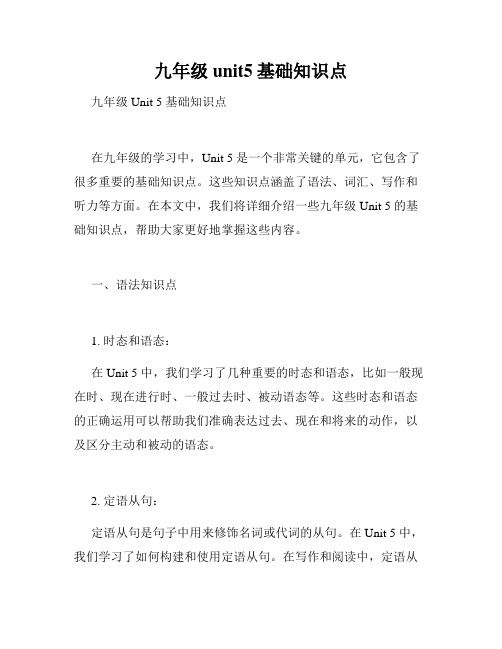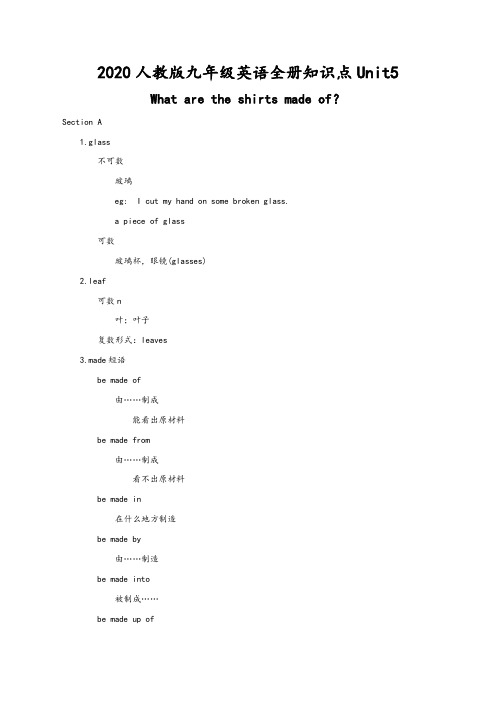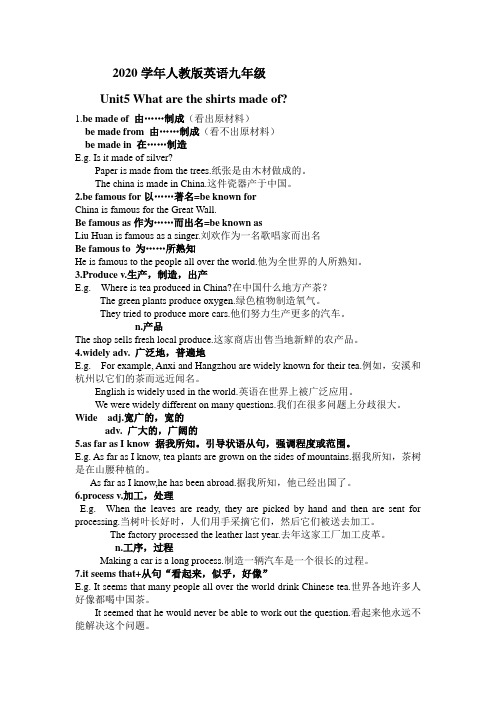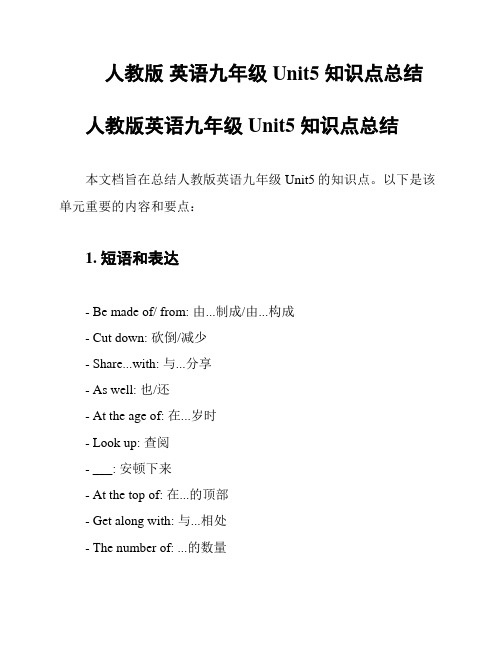2020年人教版英语九年级Unit5单元知识点总结
人教版 英语九年级 Unit5 知识点整理

人教版英语九年级 Unit5 知识点整理1.本单元主要研究了以下几个知识点:宾语从句:宾语从句是一个完整的句子,作为主句的宾语。
它通常由连接词that。
whether。
if等引导。
例如:I ___ that he is a good student.动词不定式:动词不定式由to和动词原形构成,可以作为主语、宾语、表语和宾补等。
例如:To learn English well is my goal.形容词和副词比较级:形容词和副词的比较级用来表示两者之间的程度差异,形容词比较级通常在词尾加-er,也有不规则变化形式。
例如:This book is more interesting than the one I read before.特殊疑问词:特殊疑问词用来引导特殊疑问句,包括:what。
where。
when。
why。
who。
whom。
which。
how等。
例如:What is your favorite color?定语从句:定语从句是由关系代词或关系副词引导的从句,用来修饰一个名词或代词。
例如:The book that you lent me is very interesting.2.需要注意的几个语法点:不定式作主语时,动词不定式的逻辑主语是动词原形后面的动作的承受者。
例如:___.副词比较级的构成规则:形容词/副词比较级 + than + 原级 + [其他成分]。
例如:___.特殊疑问词的使用需要根据不同的情况进行选择。
例如:Where do you live?(询问地点)以上是本单元的知识点整理,希望对你的研究有所帮助。
九年级unit5基础知识点

九年级unit5基础知识点九年级 Unit 5 基础知识点在九年级的学习中,Unit 5 是一个非常关键的单元,它包含了很多重要的基础知识点。
这些知识点涵盖了语法、词汇、写作和听力等方面。
在本文中,我们将详细介绍一些九年级 Unit 5 的基础知识点,帮助大家更好地掌握这些内容。
一、语法知识点1. 时态和语态:在 Unit 5 中,我们学习了几种重要的时态和语态,比如一般现在时、现在进行时、一般过去时、被动语态等。
这些时态和语态的正确运用可以帮助我们准确表达过去、现在和将来的动作,以及区分主动和被动的语态。
2. 定语从句:定语从句是句子中用来修饰名词或代词的从句。
在 Unit 5 中,我们学习了如何构建和使用定语从句。
在写作和阅读中,定语从句可以帮助我们更精确地描述事物,并且让句子更加丰富和有层次感。
3. 状语从句:状语从句是句子中用来表示时间、原因、条件、目的、结果等的从句。
在Unit 5 中,我们学习了如何使用不同类型的状语从句。
状语从句的运用可以帮助我们更准确地表达自己的意思,并且让语言更具连贯性和流畅性。
二、词汇知识点1. 单词拼写:在 Unit 5 中,我们学习了很多新的单词,并且需要掌握它们的正确拼写。
拼写正确的单词可以让我们的写作更加规范和地道,同时也提高了我们的阅读理解能力。
2. 同义词和反义词:在 Unit 5 中,我们也学习了一些同义词和反义词。
通过学习这些词语,我们可以扩展自己的词汇量,并且在写作和阅读中更加丰富我们的表达。
三、写作知识点1. 句型多样化:在写作中,我们需要尽量避免使用重复的句型,而是要多样化地表达自己的意思。
在 Unit 5 中,我们学习了一些新的句型和表达方式,可以帮助我们更好地组织和呈现自己的观点。
2. 写作连贯性:写作时,我们需要注意句子之间的连贯性。
通过使用适当的过渡词和连接词,我们可以使句子更流畅,段落更有逻辑性。
在Unit 5 中,我们学习了一些常用的连接词,比如however、therefore、in addition等。
2020 年人教版九年级英语全册知识点Unit5

2020人教版九年级英语全册知识点Unit5What are the shirts made of?Section A1.glass不可数玻璃eg: I cut my hand on some broken glass.a piece of glass可数玻璃杯,眼镜(glasses)2.leaf可数n叶;叶子复数形式:leaves3.made短语be made of由……制成能看出原材料be made from由……制成看不出原材料be made in在什么地方制造be made by由……制造be made into被制成……be made up of由……组成4.be famous for=be known for因……而出名eg: The restaurant is famous for delicious fish.辨析be famous as+表示身份、地位作为……而出名be famous to为……所熟知5.producev.生产;制造;出产n.product产品;制品6.It seems that...……似乎……eg: It seems that he is leaving here. 看起来他要离开这里。
句型seem to do sth.似乎要做某事seem (to be) + adj.似乎……It seems like...似乎...7.Francen.法国adj.French法语的;法国的;法国人的Frenchman法国人复数形式Frenchmen8.Germany德国German德国人复数Germans9.avoidavoid sb./sth.避免某人/某事eg:He had to take a taxi to avoid her.avoid doing sth.避免做某事eg:He avoided answering my questions.10.辨析everyday每天的;日常的形容词定语eg:The weather influences everyone's everyday life.every day每天副词短语状语eg:He picks tea leaves every day.11.一般现在时的被动语态构成:助动词be+及物动词的过去分词疑问句Is/Am/Are+主语+过去分词+其他?eg:Are these dishes washed by your mother?否定句主语+is/am/are+not+过去分词+其他eg:The blackboard is not cleaned by Kate.Section B1.paintn. 绘画;刷漆paintingn.油画;绘画辨析paint用颜料画eg: The artist paints in watercolors.draw用铅笔、蜡笔、钢笔等画eg:The child is drawing a picture with a pencil.2.formn.形式;类型v.形成;建立3.aroundadv.大约到处;周围;转弯eg: We have travelled around in Europe for six weeks.prep.到处;围绕eg: He runs around the playground.4.lively生气勃勃的;(色彩)鲜艳的辨析lively生动的作定语、表语或宾补living活着的作表语或前置定语修饰人、物alive活着的作表语、后置定语或补足语多用于人e句型be used for被用来……used to do过去常常做……be used to doing习惯于做……be used to do被用来做……be used as被用作……petev.竞争句型compete against sb.与某人竞争compete in...参加...compete to do sth.竞争做某事compete against/with sb. for sth.为某事与某人竞争competitorn.参赛者7.scissorsn.剪刀作主语时谓语动词用复数eg: These scissors are very sharp. 8.辨析complete比较正式指计划、理想、工作等完成finish普通用语完成日常的事物Section A1.glass不可数玻璃eg: I cut my hand on some broken glass.a piece of glass可数玻璃杯,眼镜(glasses)2.leaf可数n叶;叶子复数形式:leaves3.made短语be made of由……制成能看出原材料be made from由……制成看不出原材料be made in在什么地方制造be made by由……制造be made into被制成……be made up of由……组成4.be famous for=be known for因……而出名eg: The restaurant is famous for delicious fish.辨析be famous as+表示身份、地位作为……而出名be famous to为……所熟知5.producev.生产;制造;出产n.product产品;制品6.It seems that...……似乎……eg: It seems that he is leaving here. 看起来他要离开这里。
人教版九年级英语unit5知识点总结

人教版九年级英语unit5知识点总结Unit 5 is an important unit in the ninth-grade English textbook published by People's Education Press. In this unit, students are exposed to various knowledge points related to the use of tenses, vocabulary, and grammar structures. This article aims to provide a comprehensive summary of the key points covered in Unit 5 without delving into any political issues.1. Present perfect tense:The present perfect tense is formed by using "have/has + past participle" and is primarily used to describe actions that took place in the past but have a connection to the present. This tense is commonly used when referring to past experiences, completed actions with a result in the present, and actions that happened in an unspecified past time.2. Present perfect tense with for/since:When using the present perfect tense with for or since, we highlight the duration of time that an action has been happening. "For" is used to express the length of time, while "since" indicates the starting point of the action.3. Use of until/ up till now:The words "until" and "up till now" are often used in conjunction with the present perfect tense to indicate actions or situations that have been ongoing until the present moment.4. Past perfect tense:The past perfect tense, formed by using "had + past participle," is used to describe an action that happened before another action in the past. This tense is essential for expressing the sequence of events in a narrative.5. Vocabulary related to personal experiences:Unit 5 introduces a range of vocabulary words related to personal experiences, such as achievements, challenges, memories, and aspirations. Students are encouraged to expand their vocabulary by actively using these words in speaking and writing exercises.6. Comparative and superlative forms of adjectives and adverbs:Students should be familiar with the rules for forming comparative and superlative degrees of adjectives and adverbs. Regular adjectives can take the suffixes "-er" and "-est" respectively, while irregular adjectives have their unique forms, such as "good, better, best."7. The use of "so... that" and "such... that":"So... that" and "such... that" are used to express a cause-effect relationship between two clauses. "So" is used with adjectives or adverbs in the second clause, while "such" is followed by a noun phrase.8. Modal verbs for giving advice and suggestions:Unit 5 also covers the usage of modal verbs like "should," "ought to," and "had better" to give advice or make suggestions. These modal verbs offer different levels of suggestion and are commonly used in everyday language.In conclusion, Unit 5 of the ninth-grade English textbook published by People's Education Press covers a wide range of knowledge points. Understanding the correct usage of tenses, vocabulary, and grammar structures is crucial for students' language proficiency. By grasping these key points, students can enhance their speaking, writing, and comprehension skills in English.。
人教版英语九年级unit5知识点

人教版英语九年级unit5知识点Unit 5: SailingSailing is not only an enjoyable recreational activity, but it is also a sport that requires skill and knowledge. In this unit, we will delve into the various aspects of sailing, such as different types of boats, sailing techniques, and safety precautions.1. Types of BoatsThere are various types of boats used for sailing, each with its own unique design and purpose. One common type is the sailboat, which relies on the wind to propel it forward. These boats come in different sizes, from small dinghies used for leisurely sailing, to larger yachts used for cruising or racing. Another type is the catamaran, which has two parallel hulls, resulting in increased stability and speed.2. Sailing TechniquesTo effectively navigate a sailing boat, one must master certain techniques. One important skill is understanding the wind direction and utilizing it to propel the boat forward. Sailors use the points of sail, which include the windward, beam reach, and broad reach, to positionthe sails correctly. By adjusting the sails' angles, sailors can harness the wind's power and control the direction of the boat.3. Safety PrecautionsWhile sailing can be a thrilling experience, safety should always be a top priority. Before setting sail, it is important to check the weather conditions and ensure they are suitable for sailing. In addition, sailors should wear the appropriate safety gear, such as life jackets and harnesses, especially when sailing in rough weather or strong currents. It is also crucial to be aware of potential hazards on the water, such as rocks, reefs, and other boats.4. Knot TyingTying knots is an essential skill for any sailor. Different types of knots serve various purposes, such as securing ropes or attaching sails. The bowline knot, for example, is used to form a fixed loop at one end of a rope, while the clove hitch is used to fasten a rope to a pole or post. Mastering these knots provides sailors with a sense of security and control while handling the boat.5. Sailing Around the WorldFor adventurous sailors, sailing around the world is the ultimate test of skill and endurance. This journey, known as circumnavigation, involves sailing across different oceans and visiting multiple countries.A successful circumnavigation requires thorough planning, including route selection, understanding international regulations, and preparing for long periods at sea. It is a testament to the human spirit's thirst for exploration and the ability to overcome challenges.In conclusion, Unit 5 of the 9th-grade English curriculum offers a comprehensive exploration of the world of sailing. From understanding different types of boats and mastering sailing techniques to ensuring safety and learning essential knots, students will gain a better understanding of the intricacies of this exciting sport. Whether students choose to pursue sailing as a hobby or a competitive endeavor, the knowledge gained from this unit will provide them with a solid foundation to embark on their own sailing adventures.。
2020学年人教版英语九年级Unit5单词重点详解

2020学年人教版英语九年级Unit5 What are the shirts made of?1.be made of 由……制成(看出原材料)be made from 由……制成(看不出原材料)be made in 在……制造E.g. Is it made of silver?Paper is made from the trees.纸张是由木材做成的。
The china is made in China.这件瓷器产于中国。
2.be famous for以……著名=be known forChina is famous for the Great Wall.Be famous as作为……而出名=be known asLiu Huan is famous as a singer.刘欢作为一名歌唱家而出名Be famous to 为……所熟知He is famous to the people all over the world.他为全世界的人所熟知。
3.Produce v.生产,制造,出产E.g. Where is tea produced in China?在中国什么地方产茶?The green plants produce oxygen.绿色植物制造氧气。
They tried to produce more cars.他们努力生产更多的汽车。
n.产品The shop sells fresh local produce.这家商店出售当地新鲜的农产品。
4.widely adv. 广泛地,普遍地E.g. For example, Anxi and Hangzhou are widely known for their tea.例如,安溪和杭州以它们的茶而远近闻名。
English is widely used in the world.英语在世界上被广泛应用。
We were widely different on many questions.我们在很多问题上分歧很大。
2020年人教版英语九年级 Unit5 单元知识点复习总结

2020年人教版英语九年级Unit5 What are the shirts made of?重点语法:被动语态英语动词有两种语态,即主动语态和______语态。
主动语态表示主语是动作的执行者,被动语态表示主语是动作的承受者。
被动语态的结构:be+PP1.一般现在时的被动语态: am / is / are + 过去分词She waters the flowers after school.The flowers ___________ ____________by ___________ after school.2. 一般过去时的被动语态: was / were + 过去分词Guo Jingming wrote the book .The book ____________ ____________ ____________Guo Jingming.3. 一般将来时的被动语态will be +过去分词The headmaster will give a talk this afternoon.A talk ______ ______ _______ _____the headmaster this afternoon.4. 现在进行时的被动语态am/is/are+being+过去分词The driver is repairing the car.The car ____________ ___________ ___________ __________the driver.5. 过去进行时的被动语态was/were+being+过去分词My father was painting the wall.The wall ______________ ______________ _____________ by father.6. 现在完成时的被动语态:has /have been + 过去分词We have read the book..The book ______________ ____________ _____________ by ____________.7. 过去完成时的被动语态:had been + 过去分词He had invited me to visit Japan before I came here.I _______ _________ _________to visit Japan before I came here.8. 含有情态动词的被动语态: can / may /must /should +过去分词Students should do their homework.Their homework __________ _________ __________ _________students.被动语态的特殊情况:(一) make/ let /have sb. do sth. ;see/hear/ watch / notice sb. do sth变成被动语态时,后面的动词原形前需加to. :be made / seen / heard / watched / noticed to do sth.被迫/ 被看见/ 被听见/ 被观看/被注意做某事1.The boss made his workers work day and night. The workers were made to work day and night.2. I see him stand there He is seen to stand there by me.2. His doctor makes him have two meals a day.---He is _______ _______ _______ two meals a day.(使役感官真奇怪,to去to来令人猜,主动语态to离开,被动语态to回来。
人教版 英语九年级 Unit5 知识点总结

人教版英语九年级 Unit5 知识点总结人教版英语九年级 Unit5 知识点总结本文档旨在总结人教版英语九年级Unit5的知识点。
以下是该单元重要的内容和要点:1. 短语和表达- Be made of/ from: 由...制成/由...构成- Cut down: 砍倒/减少- Share...with: 与...分享- As well: 也/还- At the age of: 在...岁时- Look up: 查阅- ___: 安顿下来- At the top of: 在...的顶部- Get along with: 与...相处- The number of: ...的数量2. 句型和语法- 主语+ V-为-IO DO: 例如:___.(我给妈妈买了一件礼物。
)- There be句型: 例如:There is a big park near my house.(我家附近有一个大公园。
)- 状语从句: 例如:I will go swimming if it doesn't rain.(如果不下雨,我会去游泳。
)3. 词汇- Sweat: 汗水- Balanced: 均衡的- Environment: 环境- Admire: 钦佩- us: 好奇的- Basement: 地下室- Apartment: 公寓- Detector: 探测器- Forever: 永远- ___: 替换品请注意,以上内容仅为知识点总结,具体的例句、用法和解释请参考教材或额外的研究资料。
希望这份文档对您有所帮助!*文档字数:xxx字*。
- 1、下载文档前请自行甄别文档内容的完整性,平台不提供额外的编辑、内容补充、找答案等附加服务。
- 2、"仅部分预览"的文档,不可在线预览部分如存在完整性等问题,可反馈申请退款(可完整预览的文档不适用该条件!)。
- 3、如文档侵犯您的权益,请联系客服反馈,我们会尽快为您处理(人工客服工作时间:9:00-18:30)。
2020年人教版英语九年级Unit5 What are the shirts made of?重点语法:被动语态英语动词有两种语态,即主动语态和______语态。
主动语态表示主语是动作的执行者,被动语态表示主语是动作的承受者。
被动语态的结构:be+PP1.一般现在时的被动语态: am / is / are + 过去分词She waters the flowers after school.The flowers ___________ ____________by ___________ after school.2. 一般过去时的被动语态: was / were + 过去分词Guo Jingming wrote the book .The book ____________ ____________ ____________Guo Jingming.3. 一般将来时的被动语态will be +过去分词The headmaster will give a talk this afternoon.A talk ______ ______ _______ _____the headmaster this afternoon.4. 现在进行时的被动语态am/is/are+being+过去分词The driver is repairing the car.The car ____________ ___________ ___________ __________the driver.5. 过去进行时的被动语态was/were+being+过去分词My father was painting the wall.The wall ______________ ______________ _____________ by father.6. 现在完成时的被动语态:has /have been + 过去分词We have read the book..The book ______________ ____________ _____________ by ____________.7. 过去完成时的被动语态:had been + 过去分词He had invited me to visit Japan before I came here.I _______ _________ _________to visit Japan before I came here.8. 含有情态动词的被动语态: can / may /must /should +过去分词Students should do their homework.Their homework __________ _________ __________ _________students.被动语态的特殊情况:(一) make/ let /have sb. do sth. ;see/hear/ watch / notice sb. do sth变成被动语态时,后面的动词原形前需加to. :be made / seen / heard / watched / noticed to do sth.被迫/ 被看见/ 被听见/ 被观看/被注意做某事1.The boss made his workers work day and night. The workers were made to work day and night.2. I see him stand there He is seen to stand there by me.2. His doctor makes him have two meals a day.---He is _______ _______ _______ two meals a day.(使役感官真奇怪,to去to来令人猜,主动语态to离开,被动语态to回来。
)练习:请将下列主动语态变成被动语态。
❖ 1.The farmer made the horses work the whole day.❖The horses___________ __________ __________ ___________the whole day.❖ 2.I saw a mouse run into the room.❖ A mouse ___________ ___________ __________ ___________ into the room.❖ 3.I saw Lucy play in the park just now.❖Lucy_________ __________ ___________ ______________in the park just now.❖ 4. I often hear her sing this popular song .❖She___________often_______ _______ _______ this popular song by_______.(二)当动词带双宾语时give sb.sth ; show sb sth , pass sb sth , lend sb sth时,有两种改法:1He buys his sister a bag. His sister _______ ______ a bag by him.2) 将指物的宾语提前作被动句的主语,在被动句中则指人宾语前应加“to”或“for” 。
常见加to的动词有常Eg:I give Tom a book . A book is given ______Tom by me.再如:He bought me a book.-I was bought a book by him. (以人I做主语)-A book was bought for me by him. (以物book作主语)练习:1.Lily gave us some wonderful stamps.(1)______ ________ ______some wonderful stamps by Lily(2)Some wonderful stamps_______ ________ _______ ________ by Lily双宾语,很奇特,被动语态有两个,用人简单用物难,难在人前to, for添1.He bought me a present yesterday.___________________________________ _________________________________________2.My mother made me a big birthday cake last night.__________________________________ ___________________________________________3.I have written him a letter.___________________________________ _______________________________________4.Our teacher taught us a new song last week.____________________________________ _______________________________________5.She reads her son a story every day.____________________________________ ____________________________________三、在某些“不及物动词+介词/副词”(相当于及物动词短语)的句子中,变被动语态时,动词短语要看做一个整体,千万不要漏掉介词或副词。
Eg. People often talk about that film. That film is often talked about.练习:改正下列转换中的错误:1.We shouldn’t give up the work. 误:The work shouldn’t be given . 正:2.Lily looked after the baby. 误:The baby was looked by Lily. 正:四.It is said that+从句及其他类似句型一些表示“据说”或“相信”的动词如believe, consider, expect, report, say, suppose, think等可以用于句型练习:据说男孩通过了考试。
______ ______ ______ _______ the boy has passed the exam. =The boy ____________ _____________ _____________ have passed the exam.专项练习1 The People's Republic of China __ on October 1, 1949.A. foundB. was foundedC. is foundedD. was found2 English ____ in Canada. A. speaks B. are spoken C. is speaking D. is spoken3This English song___by the girls after class.A.often singsB. often sangC.is often sang D is often sung4 This kind of car ___ in Japan. A, makes B. made C. is making D. is made5 New computers ___ all over the world.A. is usedB. are usingC. are usedD. have used6 Our room must ___ clean. A. keep B. be kept C. to be kept D. to keep7 -I'd like to buy that coat. -I'm sorry. ___.A. it soldB. it's sellingC. It's been soldD. it had been sold8 A new house ___ at the corner of the road.A. is buildingB. is being builtC. been builtD. be building9 The key ___ on the table when I leave.A. was leftB. will be leftC. is leftD. has been left10 Doctors ___ in every part of the world.A. need B. are needing C. are needed D. will need11 His new book___ next month.A. will be publishedB. is publishingC. is being publishedD. has been published12 Japanese___ in every country .A. is not spokenB. are spokenC.is speaking D is not speaking13 These papers___yet. A. have not written B. have not been writtenC. has not writtenD. has not been written14 The sports meet ___ be held until next week. A. didn't B. won't C. isn't D. doesn't15 -My shoes are worn out.A. Can't they be mended?B. Let me have a look at it.C. How much do they cost?D. Can't they mended?16 ___ the watch been repaired yet? I badly need it. A. Does B. Has C. Is D. Are17___ these desks be needed? A. Will B. Are C. Has D. Do18 Why ___ to talk about it yesterday?A. didn't a meeting holdB. wasn't a meeting heldC. wasn't held a meetingD. a meeting wasn't held19 Who was the book___? A. write B. wrote C. written D. written by20 Where ___ these boxes ? A. was B. were C. is D. am21 The flowers___often.A. must be waterB. must be wateredC. must wateredD. must water22 The books may___ for two weeks. A. be kept B. be borrowed C. keep D. borrow23 The broken bike___here by Mr Smith.A. can mendB.can mendedC.can be mendD.can be mended24 The old bridge in my hometown___ next month.A.is going to be rebuiltB. will rebuiltC. are going to be rebuiltD. are going to rebuilt25 The play_ at the theatre next Sunday.A. is going to be shownB. will shownC. will showD. is shown26 The old stone bridge ___ next week.A.is going to be rebuiltB. will be rebuildC. are going to be rebuiltD. will rebuild27 Now these magazines___ in the library for a long time.A. have keptB. are keepingC. have been keepingD. have been kept28The pot ___ for ___ hot water. A. used; keeping B. was used; keepingC. is used; to keepD. are used; keep29Tea ___ in the south of China. A. grows B. is grown C. were grown D. will grow30 The bridges___ two years ago. A. is built B. built C. were built D. was built31 Wet clothes are often ___ up near a fire in rainy weather.A. hangB. hangedC. hangingD. hung32 The river smells terrible.People must ___dirty things into it.A. be stopped to throwB. be stopped from throwingC. stop to throwD. stop from throwing33 The teapot ___ water.A.is filled withB. filled ofC. fulling ofD. filled34Old people must be looked after well and ___ politely.A. speak toB. spokenC. speakD. spoken to35 Old people must ___.A.look after well B.be looked well afterC. looked well afterD. be looked after well36 Newly-born babies___in hospital.A. are taken good careB. are taken good care ofC. take good care ofD. take good care37 They were___ at the sudden noise. A. frightening B. frightened C. frighten D. frightens 38These walls___stone. A.are made of B. made of C.are made into D. made into39 Jane ___ to sing us an American song last Saturday.A. calledB. was askedC. toldD. was said40 The papers ___ to them. A. were shown B. show C. shown / D. have shown41 The coat___her sister.A. made toB. were made forC. was made forD. was made to42 I___ five minutes to decide whether I should go or not.A. gaveB. was givingC. had givenD. was given43 Good care____such things.A.should take ofB. should be takenC. should be takingD. should be taken of 44She will____good care____.A. take; ofB. be taken; ofC. take; for youD.be taken; of you45The teacher made him___ his homework.A. to doB. doC. didD. done46 The boy___ streets without pay in the old days.A.was made to cleanB.made cleanC.made to cleanD.was made clean47 These children____dance.A. were seen toB. were seen forC. were seenD. saw to48 Thesestones___well. A. are fitted B. fit C. fits D. is fitted()49 The bike ___ 500 yuan.A. was costB. costedC. costD. is costed( )50 The important meeting ___ on a cold morning last year.A. was hadB. was heldC. heldD. had( ) 51 Great changes___ in the past ten years in China.A.took placeB.have taken placeC.were taking placeD.had taken place( ) 52 You can't use the computer, it____.A. was broken downB. is wrongC. is badD. has broken down( ) 53 Great changes___in our country during the past 20 years.A.have happenedB. happenedC. have been happenedD. were happened( ) 55 The watch has often ___ down.A. satB. lainC. brokenD. fell() 56 Please pass me another cup. This one___.A. is brokenB. is breakingC. brokeD. broken( ) 57 The story books___ by the writer in the 1960s.A. are writtenB. were writtenC. are writingD. were writing( ) 58 What time ___ the door ___ every day?A. does; closedB. does; closeC. is; closedD. /; close()59 Can he___himself?A. get dressB. get dressedC. gets dressedD. instead of( )60 He fell from his bike and ___.A.is hurtB. gets hurtC. got hurtD. hurtKey:1---5 BDDDC6—10 BCBBC11---15AABBA16--20BABDB21---25BADAA26---30ADBBC 31---35DBADD 36---40BBABA41---45CDDBB46----50AAACB51---55DDACA 56---60BCBCC。
